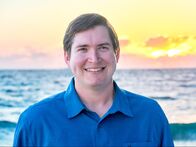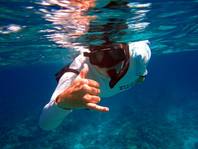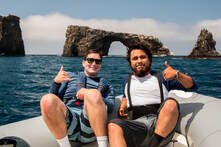Marine Ecologist
My research leverages the power of genomics tools, particularly DNA metabarcoding, to conduct detailed assessments of marine community diversity, identifying, and unraveling the complex assembly and trophic interactions that drive ecosystem health. I am specifically interested in the response of marine ecosystems to local (pollution, overfishing, habitat destruction) and global (climate change, ocean acidification and hypoxia) abiotic and biotic stressors. My research is focused on 1) understanding how climate change (ocean acidification/hypoxia and warming oceans) are impacting the Pacific through novel quantitative metabarcoding applications; 2) developing routine eDNA biomonitoring of key coastal and estuary species and habitats; and 3) improving eDNA methods. I do this work through NOAA's Pacific Marine Environmental Laboratory's Ocean Molecular Ecology Program where I serve as the group lead. The group applies a suite of conservation genetics tools including population genetics, transcriptomics, and metagenomics to better understand how our marine ecosystems are responding to anthropogenic stressors. The ultimate goal of our research is to design and implement innovative molecular approaches to provide higher resolution inventories of marine biodiversity, increasing monitoring comprehensiveness as well as frequency in time and space. Critically, our research directly informs conservation and resource management priorities, engages community scientists, and trains the next generation of diverse marine scientists.
Previously, I was a scientist jointly appointed to the Southern California Coastal Watershed Research Project, Scripps Institution of Oceanography, and California Cooperative Fisheries Investigations leading the development and application of environmental DNA (eDNA) methods for marine conservation efforts in Southern California. Before that, I was a postdoctoral researcher at CICOES at the University of Washington and the Northwest Fisheries Science Center at NOAA working with Dr. Kim Parsons and Prof. Ryan Kelly using eDNA to better understand the trophic ecology and foraging behavior of endangered Cook Inlet Beluga Whales. In 2020, I received my PhD from UCLA in Professor Paul Barber's Lab where I developed eDNA tools to comprehensively survey marine biodiversity inside and outside of Southern California's marine protected area network. I received a B.S. in Marine Biology with Honors from Stanford University in 2015 studying the growth patterns of thermally resilient Acropora hyacinthus under Professor Stephen Palumbi.
From these experiences, I have a background in coral reef, kelp forest, intertidal, and coastal pelagic ecology and have had the fortune to work on study systems across the world from Indonesia to the Alaska. I have spent my career working at the intersection of research, management, and policy on marine and aquatic ecosystems with a strong focus on conducting science needed to directly inform management and policy decisions to better protect and enhance our vital marine ecosystems.
As an avid body surfer, former CA state ocean lifeguard, Life Aquatic fan, National Geographic Young Explorer, and scientific scuba diver growing up Santa Monica, I have a deep passion for coastal communities and the marine environment.
Previously, I was a scientist jointly appointed to the Southern California Coastal Watershed Research Project, Scripps Institution of Oceanography, and California Cooperative Fisheries Investigations leading the development and application of environmental DNA (eDNA) methods for marine conservation efforts in Southern California. Before that, I was a postdoctoral researcher at CICOES at the University of Washington and the Northwest Fisheries Science Center at NOAA working with Dr. Kim Parsons and Prof. Ryan Kelly using eDNA to better understand the trophic ecology and foraging behavior of endangered Cook Inlet Beluga Whales. In 2020, I received my PhD from UCLA in Professor Paul Barber's Lab where I developed eDNA tools to comprehensively survey marine biodiversity inside and outside of Southern California's marine protected area network. I received a B.S. in Marine Biology with Honors from Stanford University in 2015 studying the growth patterns of thermally resilient Acropora hyacinthus under Professor Stephen Palumbi.
From these experiences, I have a background in coral reef, kelp forest, intertidal, and coastal pelagic ecology and have had the fortune to work on study systems across the world from Indonesia to the Alaska. I have spent my career working at the intersection of research, management, and policy on marine and aquatic ecosystems with a strong focus on conducting science needed to directly inform management and policy decisions to better protect and enhance our vital marine ecosystems.
As an avid body surfer, former CA state ocean lifeguard, Life Aquatic fan, National Geographic Young Explorer, and scientific scuba diver growing up Santa Monica, I have a deep passion for coastal communities and the marine environment.
Photographer
I have always been fascinated the incredible diversity and beauty of this strange and gorgeous world we inhabit. Trying to illuminate the incredible facets of natural world on research expeditions and travels inspired become an avid amateur nature photographer. Photography can distill and convey complex science beautifully. Whether it's scuba diving in tropical reefs or backpacking in the Cascades, I strive to capture the intricate beauty and complexity of our vital ecosystems and the environmental impacts that threaten them. I also get stoked taking pictures of food, street art, bad signage, and the wonderful friends I've made along the way.
Environmentalist
I am a strong supporter of both science based policy and individual action to address the rising threats climate change, ocean acidification, marine debris, food and water security, overfishing, habitat degradation, and pollution. Environmental and social justice must be at the forefront of successful and lasting environmental policy and bring relief and resilience to frontline communities. I have had the privilege to volunteer for a wide range of advocacy groups tackling transportation, climate change, workers' rights, and marine conservation issues.


